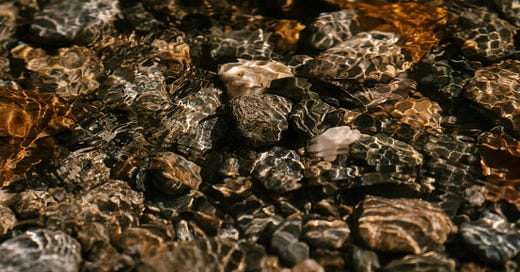William Blake was both a painter and poet, who embodied many of the tenets of Romanticism long before the movement began. His most famous poem today is probably The Tiger” which begins “Tiger, Tiger, burning bright / in the forests of the night.” It is fairly representative of his style, as he liked to pick some animal, person, or bit of nature and examine it closely, showing the reader of the poem something they may not have traditionally associated with the poems subject.
The Clod and the Pebble "Love seeketh not itself to please, Nor for itself hath any care, But for another gives its ease, And builds a Heaven in Hell's despair." So sung a little Clod of Clay Trodden with the cattle's feet, But a Pebble of the brook Warbled out these metres meet: "Love seeketh only self to please, To bind another to its delight, Joys in another's loss of ease, And builds a Hell in Heaven's despite."
Two different versions of love. The first stanza offers one definition for love, and the third presents something entirely different. In the first stanza, love is self gift. It looks to please the other, it has no care for itself. This love, we hear, brings paradise, brings “heaven” with it. Against all odds it even builds heaven in “Hell’s despair.” Yet in the third stanza, we hear that love looks to please only itself. It takes something and “binds'“ it towards its own end. Love is about making yourself feel good. And this love “builds a Hell in Heaven.”
What are we supposed to do with such radically opposed viewpoints? Well, it is interesting to look at who is saying each of these things, and that is what we find in the second stanza. It is a “little clod of clay trodden with the cattle’s feet” who proclaims love as gift. Dirt. Mud. Squishy between your toes. That is rarely where we would typically look for high philosophy. Who then proclaims love as self pleasure? It is a “pebble of the brook” who speaks in response to our high minded clump. Admittedly, we don’t get from the poet a description of the brook, but as someone who has dipped his feet in a mountain stream from time to time, I promise you it feels good. I think it would be a cush life to forever feel the stream on your tough rock skin, ever exfoliated, ever washed, ever relaxed.
So why? Why does trodden dirt see love as self gift, and pampered pebble see it as self pleasure. It may be that rather than acting out of our beliefs, we believe out of our actions. Or in other words, what we do shapes who we are, and not the other way around. So give and you will value gift, receive and you will only care to receive again. But it is not so circular as to be pointless. For even if you don’t believe the dirt when he tells you the fruit of his self gift, you ought to believe the pebble. Believe him, he knows well his power to despair in the middle of pleasure.





